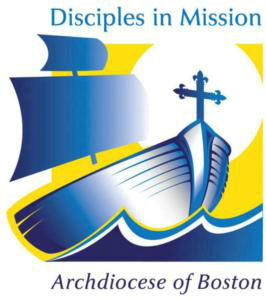Phase II collaboratives enter next stage of planning
Phase II collaboratives were inaugurated in June 2014, but months earlier the pastors came for preliminary training to look at strategies to help stabilize parishes for the work of evangelization. Since September, training has been in high gear: first parochial vicars and then parish councils, finance councils, and school boards. The final group scheduled for training is parish staff and collaborative leadership teams. Evangelization training is aimed at helping participants on their own spiritual journey and their own relationship with Christ, as well as learning about and sharing best practices for evangelizing others. The leadership track presents skills to help collaborative teams effectively work together toward a common goal.
The Winter That Would Never End interrupted the training schedule, but now these collaboratives are ready to begin stage 5, the final stage that leads to writing the local pastoral plan for each collaborative. The Catholic Leadership Institute (CLI) describes stage 5 as, "not simply training. Stage 5 is also a process of consultation, facilitation, reflection and discernment." This stage has three components: evangelization and leadership for the staff, and plan writing guidance for the members of the collaborative local pastoral plan writing committee. This committee is made up of pastor and/or parochial vicar, or permanent deacon, some members of the staff and councils, and parishioners. Stage 5 will meet in April, May, June, September and October.
The April gatherings are all about evangelization. The team from the Office for Lifelong Faith Formation and Parish Support (OLFFPS) began stage 5 training on April 14, meeting with the Amesbury/Newburyport and Wilmington collaboratives. Pope Francis' apostolic exhortation, "The Joy of the Gospel" is a foundational resource and Cardinal Sean O'Malley's pastoral letter, "A New Pentecost," guides the agenda.
Cardinal O'Malley writes, "Since evangelization is a central activity of our parishes, it will be a critical component in pastoral planning in our archdiocese." He contends that, "There are many ways to identify a healthy, vibrant parish," and he names key components.
-- Resources and Spirit to Evangelize
-- Strong and healthy programs of faith formation for young people and adults
-- A culture of promoting vocations
-- Active sacramental life
-- Apostolic and charitable activities
Patrick Krisak, director of Evangelization and Training, and the evangelization team look at each component and provide background on the topic as well as references to pivotal Church documents, and best practices for collaboratives to adopt or adapt. The three-hour evangelization sessions are structured for both input and discussion. After opening prayer the team gives a brief initial presentation; participants have an opportunity to reflect on what they have heard, and then engage in group discussion. Patrick refers to the April evangelization trainings as "a teaser, an overview." This format, "gives collaboratives the freedom to choose the areas that are a priority for them, for writing their plan." From now through spring 2016, the staff of OLFFPS will return to the collaboratives to expand on a topic (or topics) that the collaborative has selected for more in-depth presentation. Father Dan Hennessey follows up with each collaborative to help them work on the vocation component of the local plan. In May, Phase II collaboratives will begin their leadership training and the work of drafting their local pastoral plan.
Many factors led to the promulgation of the pastoral plan. Cold, hard, facts highlight the diminishing number of priests and qualified lay ministers, the lack of money for salaries, upkeep of church facilities and repairs, and the declining number of people coming to church and the sacraments; by some accounts participation is declining at a rate of 2 percent a year. All of these concerns are real and serious. But the most serious is the last: lack of people participating in the sacramental life of the Church. If other deficits are resolved, but people are not living their faith in prayer, sacraments, words, and actions, then this plan will not succeed.
Father Paul Soper, director of the Office of Pastoral Planning, is currently temporary administrator of the Dorchester collaborative of St. Ann Parish and St. Brendan Parish. He has a unique perspective on the pastoral plan and has not shied away from his long-held conviction that, "Parish-based evangelization works, and we can train for it, but to do so, we need strong parishes." Prayers and gratitude to the trainers and participants who are part of stage 5 training.
SUSAN ABBOTT IS COORDINATOR OF PARISH OUTREACH FOR THE ARCHDIOCESE OF BOSTON'S OFFICE OF PASTORAL PLANNING.
- SUSAN ABBOTT IS EVANGELIZATION ASSOCIATE, OUR LADY OF GOOD VOYAGE SHRINE.



















